Derivatives are financial products whose value is derived from another underlying asset. These assets can be debt or equity securities, currencies, commodities or indices.
Investors use these financial instruments like Derivatives, Futures and option trading to hedge risks such as commodity price fluctuations or other factors.
Experienced traders in the stock market use various strategies by using these financial instruments to make profits out of it.
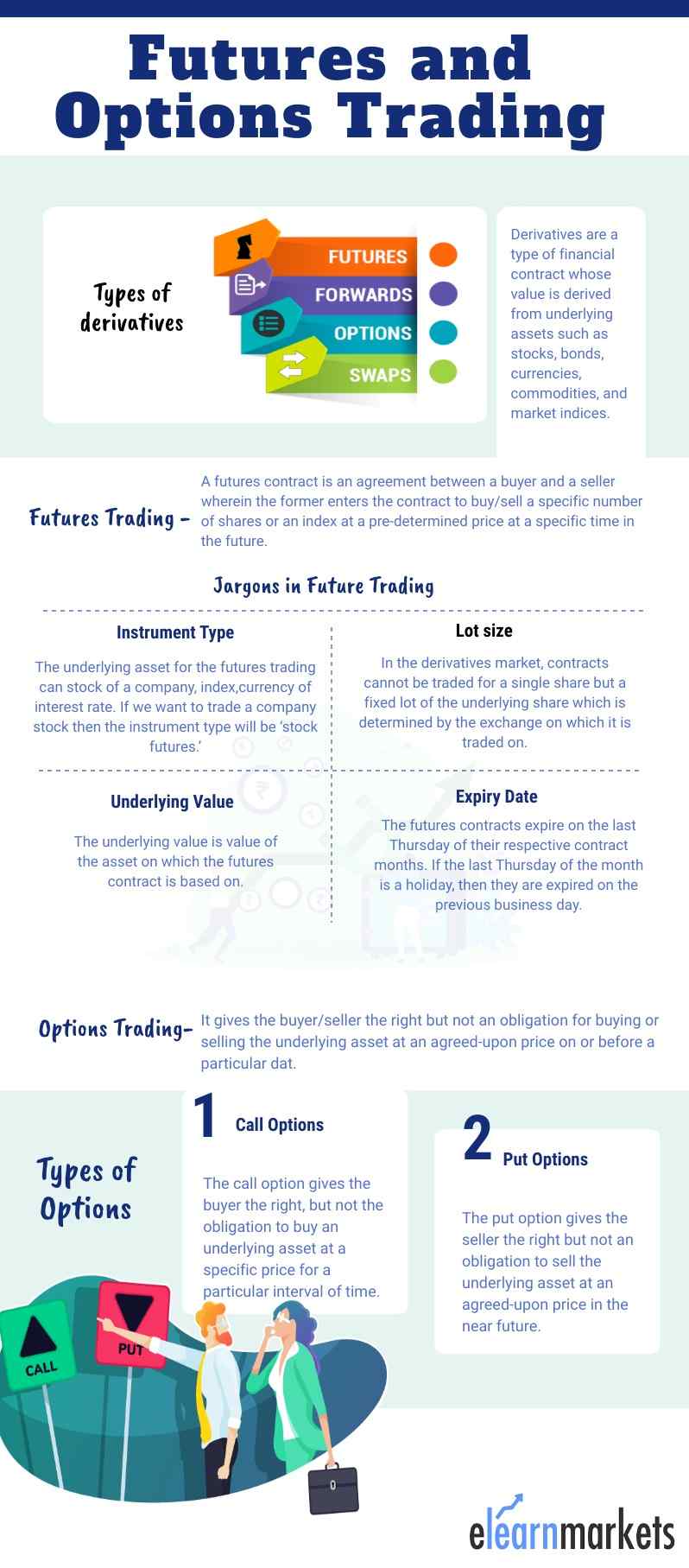
What is Derivative?
Derivatives are a type of financial contract whose value is derived from underlying assets such as stocks, bonds, currencies, commodities and market indices whose value keeps changing according to market sentiments.
Traders usually enter into derivative contracts for earning profits through speculating the value of the underlying asset in future.
Suppose the market price of an equity share may go down and you may suffer losses owing to a fall in the stock value. In order to hedge this loss, you may enter a derivative contract to make gains or to cushion yourself from the losses in the spot market where the stock is being traded.
Types of derivatives-
Here are the types of Derivatives:
1. Futures
A futures contract is a type of derivative contract where there is an agreement between two parties for buying or selling an asset at a particular price at a certain time in the future.
2. Forwards
Forwards are just like futures except the latter are standardized contracts, whereas forwards are customized contracts between two parties in which settlement takes place on a specific date in the future at a specific price.
3. Options
Options are types of derivatives contracts between an option writer and a buyer which gives them the right to buy/sell the underlying such as assets, other derivatives, etc. at a particular price on a given date. Trade in options requires a combination with option strategies it can be a good profit-making machine.
4. Swaps
Swaps are private contracts between two parties in which an exchange of cash flows of the financial instruments that are owned by the parties takes place.
The two commonly used swaps are interest rate swaps and currency swaps.
What is Futures Trading?
A futures contract is an agreement between a buyer and a seller wherein the former enters the contract to buy from the latter, a specific number of shares or an index at a pre-determined price at a specific time in the future
A futures contract is standardized in terms of expiry dates and contract sizes and they can be traded on exchanges.
Types of futures
Here are the types of future contracts:
1. Index Future
Index Future is a type of futures contract whose underlying value is based on the stock index.
A stock index helps in measuring changes in the prices of a group of stocks over a period of time which is made by selecting stocks of same sector or size.
For instance, the Nifty 50 is comprised of 50 liquid and fundamentally strong companies.
2. Stock Future
Stock futures are derivative contracts that give the power to buy or sell a certain set of stocks at a particular price on a certain date. Once the traders buy the contract, they are obligated to uphold the terms of the agreement.
3. Currency & Commodity Future
Currency futures also known as the forex futures, are exchange-traded futures contracts for buying or selling a particular amount of currency at a specific price and date in the future.
4.Interest Futures
An interest rate future is a type of futures contract with an underlying instrument which pays interest. It is an agreement between the buyer and seller for the future delivery of any interest-bearing asset at a particular price.
Jargons in Future Trading
Here are the most common terms that traders should know when trading futures:
1. Instrument Type- The underlying asset for the futures trading can stock of a company, index, currency of interest rate. If we want to trade a company stock then the instrument type will be ‘stock futures.’
2. Lot size- In the derivatives market, contracts cannot be traded for a single share but a fixed lot of the underlying share which is determined by the exchange on which it is traded on. For example, a Reliance Industries Ltd. (RIL) futures contract has a lot of 250 RIL shares that means when we buy one lot of futures contract of RIL, we are actually futures trading 250 shares of RIL.
3. Underlying Value- The underlying value is the value of the asset on which the futures contract is based on.
4. Expiry Date- The futures contracts expire on the last Thursday of their respective contract months. If the last Thursday of the month is a holiday, then they are expired on the previous business day.
What is Option Trading?–Trade in Options
An option is a derivative contract that is used as a hedging tool.
It gives the buyer/seller the right but not an obligation for buying or selling the underlying asset at an agreed-upon price on or before a particular date.
After knowing what is option trading, let us discuss the types of option trade:
Types of Option Trade
Here are the types of options contracts:
Call Option
The call option gives the buyer the right, but not the obligation to buy an underlying asset at a specific price for a particular interval of time.
Investors often buy the call options when they have a bullish view in the near future, while they’ll sell the call if they have a bearish view on the stock.
Put Option
The put option gives the seller the right but not an obligation to sell the underlying asset at an agreed-upon price in the near future.
An investor with a bearish view of the stock price will buy put or sell if they have a bullish view on the stock prices.
Jargons in Options
Here are the most common terms that traders should know when trading options:
1. Strike Price- It is the price at which the holder of a derivative contract exercises his right. Selecting a strike price in options trading is very essential.
2. Premium– It is the cost that is associated with a derivative contract, referring to the combination of intrinsic value and time value.
3. Option Expiry- The options expire on the last Thursday of their respective contract months. If the last Thursday of the month is a holiday, then they are expired on the previous business day.
4. Option Settlement– The settlement is done between the buyer and the writer of the options which can be cash settlement and physical settlement.
5. Underlying price- The underlying price is the value of the asset on which the futures contract is based on.
Introduction to Option Greeks
Option Greeks help in the pricing of the options and they also help the trader in trading options.
With the help of these Greeks, traders are able to price the options premium, understand volatility, manage risk, etc.
There are five different types of option Greeks – Delta, Gamma, Theta, Vega, and Rho and they also have an impact on each other.
Trade in Options and Futures
Traders who are wanting to hedge their position in the equity market should trade in futures and options to hedge their positions in the cash market.
This market is not for beginners as it involves huge risk and one may lose his/her capital if entered without knowledge.
What is Open Interest (OI)?
In the futures market, a buyer and seller together they make up one contract. Open Interest refers to the number of outstanding contracts in the market.
The changes in the open interest whether an increase or decrease in each stock is recorded both during the live market and also at the end of the day shown by the positive or negative change.
We can check the open interest data at the end of the trading session on the NSE website.
We can see from the below image how open interest helps us in analyzing the stock price movements–
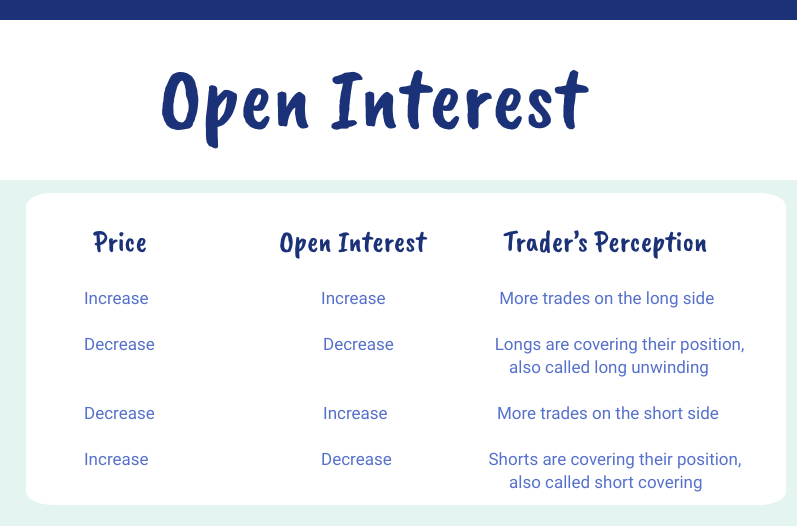
Key Takeaways
- Derivatives are financial products whose value is derived from another underlying asset. These assets can be debt or equity securities, currencies, commodities or indices.
- A futures contract is a type of derivative contract where there is an agreement between two parties for buying or selling an asset at a particular price at a certain time in future.
- The future contracts can be index, currency, stock and interest rate futures.
- Options give the buyer/seller the right but not an obligation for buying or selling the underlying asset at an agreed-upon price on or before a particular date.
- Options can be put or call options
- Option Greeks helps in the pricing of the options and they also help the trader in trading options.
- Open Interest refers to the number of outstanding contracts in the market.
Disclaimer: One should remember that trading the futures and options involves risks.
To learn more about Futures and Options, you can join our Future and Options Trading Course.
Frequently Asked Questions
Q. What is the difference between a Future contract and a Forward Contract?
Here are some basic differences between forward and futures contract:
- A forward contract is an agreement between parties to buy and sell the underlying asset at a certain price on a future date whereas a future contract is a contract whereby the parties agree to buy and sell the asset at a fixed price and a future specified date.
- Forward contracts are customized contracts whereas a futures contract is a standardized one where the conditions such as quantity, date, and delivery are standardized.
- Forward contracts are traded Over the Counter whereas the Futures contract is traded in an organized securities exchange.
- When it comes to settlement, forward contracts are settled on a maturity date whereas the future contracts are marked to market on a daily basis, i.e. the profit or losses are settled daily.
- There is a high counterparty risk involved in forward contract as compared to a futures contract.
Q. Can I have a short position in Futures and Option trading?
Yes, traders can have a short position in the futures and options.
Q. Can I exercise my Option before the Expiry?
Yes, the option can be exercised any time before expiry, regardless of whether the strike price has been reached.
Happy Investing!


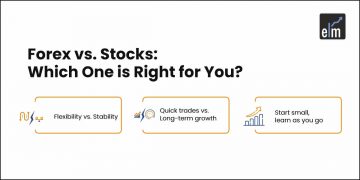
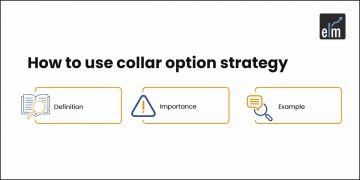
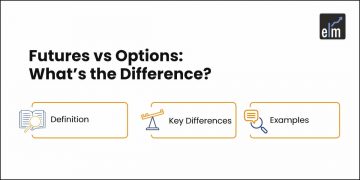
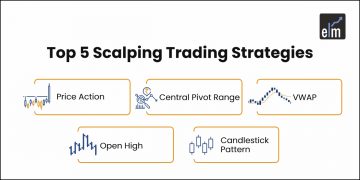


Thank you for taking the time to explain this tough subject in your posts. Investing in F & O can be daunting, but with your assistance in simplifying difficult topics, derivatives investment is now possible for basic traders too.
Hi,
We really appreciated that you liked our blog! Thank you for your feedback!
Keep Reading!